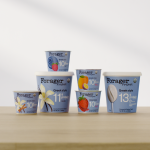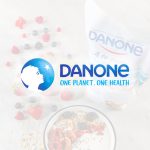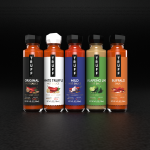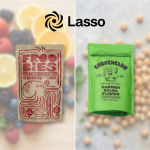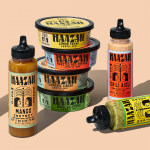Fancy Food: Chef-led Brands Generate Buzz; Honey Brands Battle For The Bees
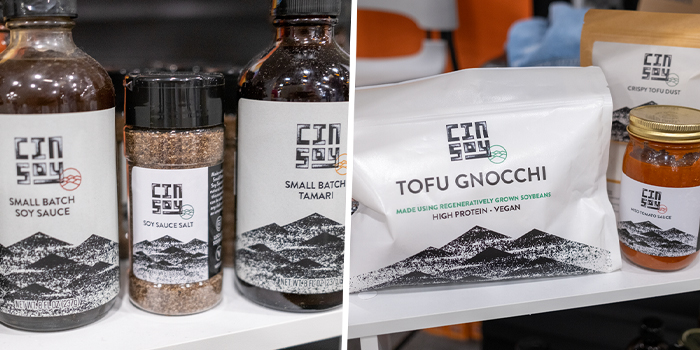
Chef Led Brands Generate Buzz: Cin Soy Embraces Regenerative Ag
Launched only weeks before the onset of the pandemic, regenerative agriculture-focused pantry staple brand Cin Soy made its trade show debut in the Startup Pavilion of the Fancy Food Show this week. The company used the occasion to introduce its latest innovation: frozen tofu gnocchi, sampled in its miso tomato sauce.
According to a brand representative, the Ohio-based company sources its main ingredient, soy, from Dave Brandt, a local farmer who has been growing soybeans through regenerative practices for nearly 50 years. Brandt enjoyed a taste of celebrity right around the time he became Cin’s soy supplier when an image of him from an interview with the United States Department of Agriculture about his soil practices became a viral meme in January 2020.

The company itself was launched by classically-trained chef Sam Pellerito who started his career cooking in Wales and Australia and found the best ingredients most often came from local farmers. Currently, Cin makes a range of soy-focused pantry staples at his Ohio factory including miso, soy sauce and soy sauce salt. The company brought in other regenerative crops, including buckwheat and millet, to make its small batch tamari. According to a brand rep, Brandt hand delivers all the company’s ingredients to the factory.
However, Cin was only one of many chef-led companies showcasing their wares on the show floor. Grass-fed butter brand Churn debuted with a 9-SKU lineup of small batch butter in flavors ranging from Black Garlic to Bruscetta. Founder Michael Tashman, counts both his parents as employees on the startup’s small team.
Churn is sold primarily direct-to-consumer at the moment, but Tashman said he has hopes of expanding its retail footprint soon. One of the main challenges is on-shelf placement; due to the premium price point – which can range from $7 to $10 per 5.5 oz tub at retail, depending on the flavor – buyers have been wary of making space in existing butter sets.
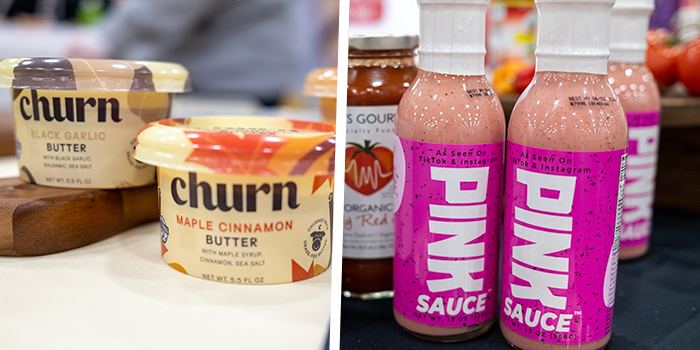
Eventually, Churn hopes to offer the products in blocks or sticks, believing that may be more familiar and accessible to everyday consumers; however, due to the product’s softer consistency when fresh as well as the high cost of machinery necessary to make other formats, tubs are the most cost-effective and foolproof way packaging method at the moment, Tashman said.
Also making its trade show debut was Chef Pi’s Pink Sauce, which has been manufactured by sauce and condiment company Dave’s Gourmet. According to a brand representative, Dave’s received a bit of backlash from media and consumers for “helping Chef Pi” after the TikTok star faced a range of issues producing and distributing her original iteration. The rep said Dave’s team saw the partnership as a win-win since it had the R&D and manufacturing capabilities necessary to sort out Chef Pi’s challenges while the online star brought increased social media awareness to the 20-year old brand.
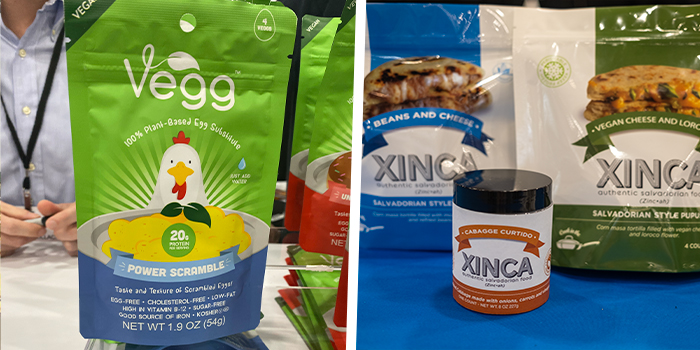
Plant-based Dairy, Eggs Alternatives See Rising Relevance In U.S. Grocery
Women-owned frozen food brand Xinca aims to cater to two growing sectors in the U.S. – plant-based consumers and an already large Salvadoran population – with its latest innovation, a vegan-friendly frozen pupusa made with cheese from fellow women-led brand RIND, by Dina & Joshua.
Xinca founder Cynthia Duran met the RIND team at last year’s Summer Fancy Food Show when the two brands had neighboring booths. After sharing some samples with one another, Duran said it seemed like the perfect opportunity to create a plant-based offering. According to Duran, Salvadorians represent the second highest immigrant population in the U.S., behind Mexico, however, that scale is not well-reflected within the CPG industry.
Among the more established plant-based brands exhibiting was Vegg, a ten-year-old vegan egg replacement and baking mix brand. According to founder Harold Bollaci, the company has been steadily growing in international markets and consistently sees high velocity in Middle Eastern and European markets. Yet the impact of the avian flu on egg prices, in addition to already heightened grocery inflation, has created strong demand in the U.S. for its shelf-stable, powdered products.
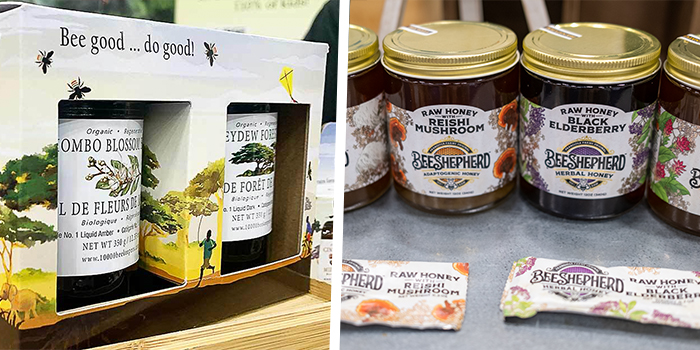
CPG Honey Brands Battle the Bee Decline
Savannah Bee Company used its new Hot Honey product as a vehicle to highlight the importance of protecting the declining bee population from climate change. According to founder, president, and head beekeeper Ted Dennard, the company’s primary focus is on “creating a world where the bees don’t need saving.”
Though bee conservation projects are certainly not a new concept, they have ramped up among CPG brands over the past few years as climate change worsens. Between 2021-2022, beekeepers in the U.S. lost an estimated 39% of their managed honey bee colonies, according to recent data.
Savannah Bee Company’s greatest legacy to date, according to Dennard, has been its Bee Cause project. Founded in 2013, the initiative places observation hives in schools across the U.S., Canada, the Bahamas and Puerto Rico to teach students about the important role honey bees play and the detrimental effects climate change has had on the pollinators. The company is slated to install its 1,000th observation hive within the next few weeks, according to Dennard.
Also exhibiting was Ontario, Canada-based honey maker African Bronze Honey Company, which partners with 10,000 beekeepers in Zambia and Tanzania to produce its sustainably harvested forest honey. Co-founder and president Liz Connell claimed its honeys – which include Cacao, Cinnamon and recently-launched Hot varieties – help regenerate the forest to combat climate change, growing the forest 3% a year.
Elsewhere, Frangiosa Farms, best known for its Bee Shephard Honey infused with adaptogens such as Lion’s Mane and Reishi Mushroom, has taken a different approach. Founded by veteran beekeeper Nick French, the brand offers an Adopt a Honey Bee program that enables consumers to help save the declining bee population by “adopting” one of the pollinators from the hives on the brand’s Parker, Colorado farm. Offered in $50, $100 and $500 donation amounts, the packages come with a bee adoption certificate and samples of Frangiosa Farms Wildflower Raw Honey.
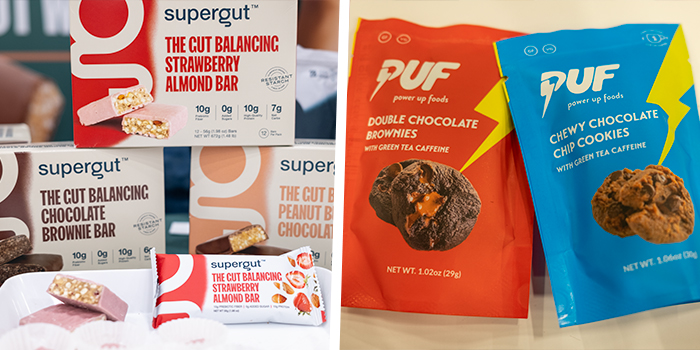
Functional Foods: New Names and Emerging Shelf Space
Fiber-forward functional food brand, formerly Muniq, debuted with a new name Supergut after quietly making the switch mid-2022 to better position the company around its key attribute, gut health. Founded in 2019 by Marc Washington, the former president and COO of weight loss brand Beachbody, Supergut also expanded its product range beyond shake mixes into nutrition bars shortly before the identity change.
Additionally, Supergut has introduced its proprietary fiber blend in stick packs which can be mixed into nearly any food or beverage, said a brand representative. Backed by a multi-year clinical trial studying its flagship fiber ingredient’s impact on gut health, and a better-aligned brand identity, the rep said Supergut is looking to move into retail and believes its science-based approach will differentiate it within the crowded functional food space.
Elsewhere, clean caffeine baked good snack brand Power Up Foods (PUF) announced it has secured a spot in Urban Outfitters stores. According to Ilene Chen, PUF founder and CEO, the inbound request came after the brand exhibited in Expo East 2022. Chen believes the clothing retailer is looking to lean into grab and go snacks which are merchandised around its cash registers alongside other beauty and wellness products. Chen highlighted that the onboarding process was very different from grocery retail, noting that the company would only communicate via email.


